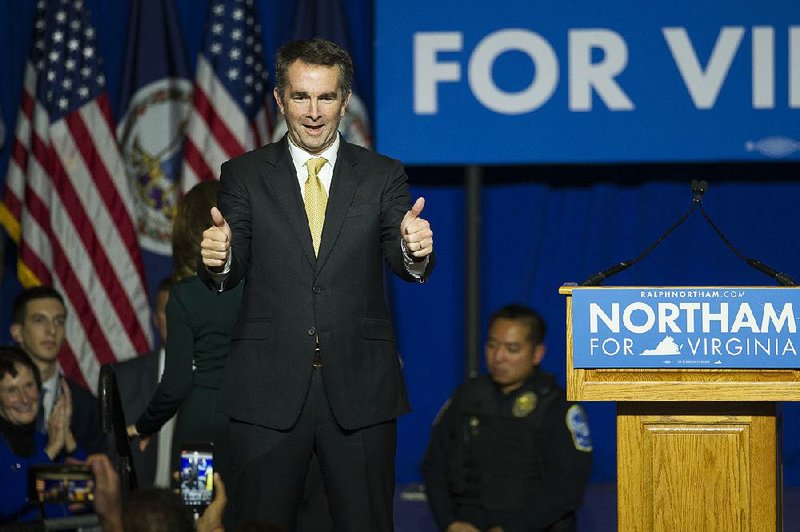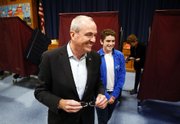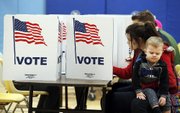RICHMOND, Va. -- Virginia voters turned out in rainy weather Tuesday to pick a new governor after months of divisive campaigning led to a slugfest overshadowed by racial overtones and attack ads.
New Jersey, a reliably Democratic state, was the only other state holding a gubernatorial election. The contests were seen as an early referendum on President Donald Trump's first year in office.
Both parties are seeking momentum ahead of next year's midterm elections. Voters in both states gave Democratic candidates large victories.
In Virginia's hard-fought contest, Democratic Lt. Gov. Ralph Northam defeated Republican Ed Gillespie.With more than 99 percent of precincts reporting, Northam had 53.9 percent of votes, and Gillespie had 45 percent.
In New Jersey, Democrat Phil Murphy overcame Republican Lt. Gov. Kim Guadagno to succeed unpopular GOP Gov. Chris Christie. With 91 percent of precincts reporting, Murphy had 55.6 percent of votes to Guadagno's 42.5 percent.
Northam tapped into voters' regret at Trump's victory in last year's presidential election. Murphy had an easier pathway in New Jersey, where Guadagno contended with both Trump's and Christie's unpopularity.
"The people are gonna rise up. They're not gonna take what he says and this is not fake news," said Leanna Barnes, a 76-year-old from East Orange, N.J., who voted for Murphy and added she saw his victory as a message to the president.
Virginia college student Tamia Mallory said she began paying attention to her state's gubernatorial race when she saw tweets from Trump endorsing Gillespie. That motivated her to examine the race and find out who was running against Gillespie, she said.
"It was kind of an anti-Trump vote," Mallory said.
Northam repeatedly tried to tie Gillespie to the president. His victory was in large part tied to a surge in anti-Trump energy since the president took office. Democrats said they had record levels of enthusiasm heading into the race.
While local politics and issues weighed heavy on voters' minds, some also were driven by lingering resentment from Hillary Clinton's loss or still excited by Trump's win.
Vickie Williams, a stay-at-home mom, voted for Gillespie "because I'm a Republican. I voted for Donald Trump. I like the policies, that's the only reason," she said. "I want to feel like America is safe. I want to feel like we have more control, less government. I feel like the other way is big government."
Gillespie kept Trump at a distance throughout the campaign but tried to rally the president's supporters with hard-edge attack ads focused on illegal immigration and preserving Confederate statues.
After Tuesday's loss though, Trump suggested that Gillespie hurt himself by not more closely aligning himself with the president.
"Ed Gillespie worked hard but did not embrace me or what I stand for," Trump said in a tweet, before pointing out that Republicans have won every special election to the U.S. House since he was elected.
Wins in Virginia and New Jersey would be a morale boost to Democrats who so far have been unable to channel anti-Trump energy into success at the ballot box in a major election this year.
Nationally, Democrats haven't won any special elections for Congress this year and the next Virginia governor will have a major say in the state's next round of redistricting, when Congressional lines are drawn. Republicans are looking for a boost as their party is beset by intraparty turmoil between Trump and key Republicans in Congress.
"If I could get rid of Trump I would be even happier. I've never seen our state so miserable and I've never seen our country so miserable," said John Holpp, an 88-year-old New Jersey voter who cast his ballot for Murphy.
In Virginia, Northam's victory was another sign of the state's shift toward a more liberal electorate. Democrats have won every statewide election since 2009, and a Northam win would give them four out of the past five gubernatorial contests. Northam banked heavily during the campaign on his political resume and tried to cast himself as the low-key doctor with a strong Southern drawl who offered an antidote to Trump.
Elsewhere, Mayors Bill de Blasio of New York City and Marty Walsh of Boston both won second terms, and Flint, Mich., Mayor Karen Weaver survived a recall effort.
Maine voters approved a measure allowing them to join 31 other states in expanding Medicaid under the Affordable Care Act. The referendum represented the first time since the signature health bill of former President Barack Obama took effect that the question of expansion was put before U.S. voters. Maine's Republican governor had vetoed five attempts to expand the program.
Information for this article was contributed by Joscelyn Paine of The Associated Press.
A Section on 11/08/2017



